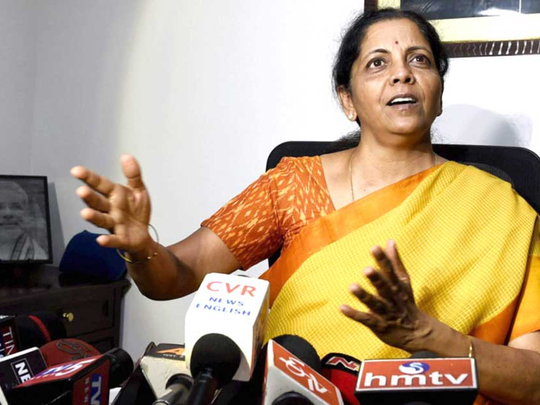
If you can ignore the media frenzy over the Cabinet reshuffle of Indian Prime Minister Narendra Modi, the appointment of Nirmala Sitharaman as India’s first woman Defence Minister was not only a body blow to those who claim to have first-hand information on the goings on in the Modi government, but also a silent death knell on the promise of achhey din (good days).
At a time when India’s economy is in a shambles, job growth is dwindling, appointment of a woman as a defence minister is a mere photo opportunity that undermines the election promise of good days and good governance.
Sitharaman’s appointment is surely high on optics, and having two very articulate women — Sushma Swaraj, the Foreign Minister, being the other — in the all-powerful Cabinet Committee on Security is a good photo opportunity. But beyond that there is nothing.
The run-up to this Cabinet reshuffle was more of a media show where Bharatiya Janata Party (BJP) president Amit Shah actually asked five ministers to submit their resignations, thereby reinforcing his authority and power in the party. The gullible Indian media was kept on tenterhooks with guessing games and the rumour mills running overtime over the constituents of the reshuffled Cabinet. In India, every news channel has its own set of experts and “sources” who seem to know everything under the sun.
During the Congreess-led United Progressive Alliance (UPA) government, keeping any information a secret was a challenge, hence these experts were often proved right. However, in this new dispensation, they have been proved worthless time and again.
Unfortunately though, millions of Indian voters who had voted for Modi in the 2014 general elections, did not do so merely to boot the Congress party out of power, but to support the promise of good governance put forward by the BJP and its leader Modi. Yet, 20 months before the next general elections, Modi’s promise of good governance and economic development rings hollow.
India’s economy has suffered mostly due to hasty decisions by the Union Government — both on demonetisation and the ill-prepared implementation of the Goods and Services Tax. The promise of 300,000 jobs a year is also a far cry, while the ill-treatment of the Defence Ministry by the prime minister has generated a lot of negative vibes on social media.
In the last three years, there have been three defence ministers, among whom, Finance Minister Arun Jaitley was holding the additional portfolio for the second time in three years, after Manohar Parrikar had to be rushed to capture Goa — a state where the BJP had finished second to the Congress in the last state elections.
However, this does not take away the efforts of Sitharaman who indeed has come a long way from being a party spokesperson — who had helped the BJP tide over several PR disasters — to being a cabinet minister.
An alumnus of Jawaharlal Nehru University (JNU), Sitharaman was born in 1959 in Madurai, Tamil Nadu. She holds a Master’s degree in Economics and has worked in London. She was also briefly with the BBC World Service. She was a member of the National Commission for Women from 2003 to 2005 and joined the BJP in 2006.
Rising through the ranks, she became a member of the party’s national executive in 2008 and was appointed spokesperson in 2010. An excellent command over the English language and an almost military-like adherence to protocol have always been her strong points. While in JNU, she had come across Parakala Prabhakar — her husband to-be — who is now the Communications Adviser to the Andhra Pradesh Chief Minister, N. Chandrababu Naidu. The couple has a daughter named Vangmayi.
However, those who are envious of her landing a plum job early in her political career should have her in their prayers as the challenges before Sitharaman are vast, complex and range across a wide spectrum of issues, and she will have a short 20-month period to tackle them before the next general elections in 2019.
She will have to learn to keep the army officers in good humour, while trying to walk the tightrope in handling the Prime Minister’s Office that controls most issues related to the ministry, while also reviewing India’s higher defence management. She will have to spearhead the modernisation drive of the Indian military in a way that will also reduce the existing dependence on imports. All this will have to be undertaken within the stringent fiscal austerity imposed by her political mentor Jaitley.
Sitharaman’s record as Union commerce minister was not enviable, where the exports sank mostly due to fall in global demands. However, now her negotiation skills will be tested as India goes out to the world with a hefty budget for defence procurement. Sitharaman will certainly have to focus on the role of women in combat posts, which had been a recurring demand in India’s fight for gender equality. If she succeeds, she could carve out a niche for herself as the defence minister who helped ensure gender equality in India’s defence forces.
Archisman Dinda is a freelance journalist based in Kolkata, India.









